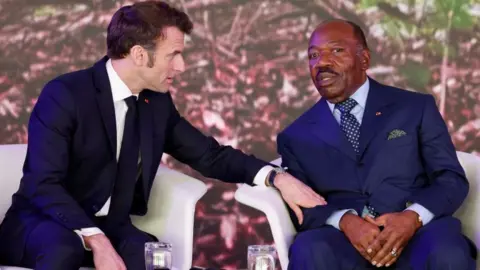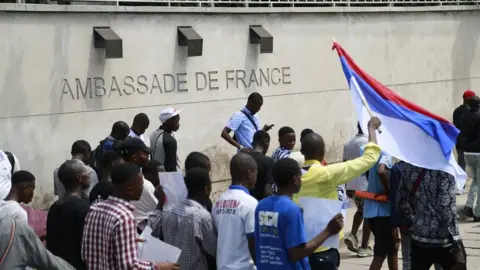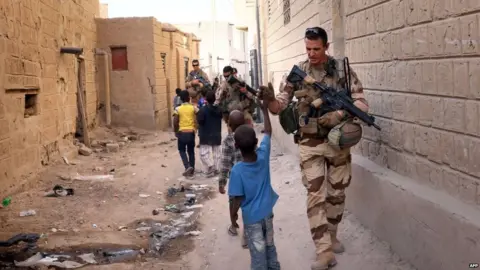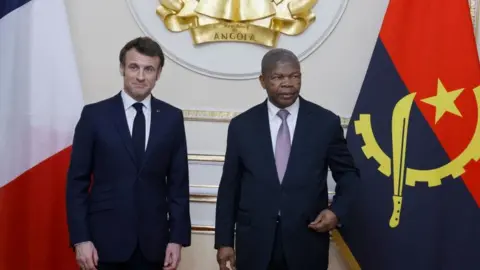Emmanuel Macron's mission to counter Russia in Africa
 AFP
AFPLibreville, Luanda, Brazzaville, Kinshasa - France's President Emmanuel Macron is on a whirlwind tour of African capitals as he tries to shift French policy on the continent away from military involvement.
He can hardly be accused of ignoring Africa - this is his 18th presidential trip - but this comes at a time of ever-increasing competition from China and Russia, and growing resentment of the close economic ties between France and its former colonial, which some see as a form of continued exploitation.
And he insists that he will come back, again and again, to a continent that he regards as a crucial partner for Europe in tackling major global issues over the decades ahead.
Although Ukraine inevitably dominates the international diplomatic agenda, Mr Macron believes that Paris and Brussels cannot afford to neglect Africa. It presents challenges and huge development opportunities, with a youthful dynamism that, he argues, will be a huge contributor to Europe's own future growth.
France's president is also acutely aware of how other nations are seeking to extend their own influence south of the Sahara.
Russia, hoping to rebuild the influence it had lost since the Cold War decades, is offering security support to governments that feel under threat or isolated from the international mainstream: mercenaries from the Kremlin-linked military contractor Wagner are now operating in Mali and the Central African Republic, where they have been accused of human rights abuses.
 Getty Images
Getty ImagesChina is a massive funder and builder of infrastructure, albeit on terms that Mr Macron fears could trap some countries in debt crisis. Turkey and India are increasingly active too.
And across the region, popular anti-French sentiment is fanned by lively social media messaging to which Paris has so far found no effective response.
In a lengthy speech on Monday evening, to prepare the ground for his latest tour, the president reasserted his own strategy to sustain a role for France in this increasingly competitive arena. It was a message addressed both to Africans and to his own domestic audience.
He does not think the French should try to match the Russian security effort by re-expanding its own military presence to match what Moscow offers.
In any case, that would hardly be an option when Paris has been forced to pull its troops out of Mali and Burkina Faso, where the military juntas now in charge are seeking to distance themselves from the former colonial power in both countries.
Instead, he aims to re-orient French support to focus more on training and technical back-up for African armed forces, with troop numbers reduced and programmes of military collaboration tailored to the specific requests of individual countries.
 AFP
AFPAnd this week Mr Macron took that policy a step further, announcing that the remaining French bases in Africa - in Senegal, Ivory Coast and Gabon - would now be co-managed and shared with the forces of the host nations, and even available to welcome other external partners if those governments wished. Only the base in Djibouti, strategically located at the mouth of the Red Sea will remain exclusively French.
He pointed out that the base in Abidjan, Ivory Coast, is well positioned for training troops from the various West African states now collaborating in efforts to prevent jihadist groups in the Sahel from pushing south towards the coast.
But he is also anxious to pursue the diversification of French engagement across a much broader canvas, touching culture, history, immigration, trade, development and even reform of the CFA franc - a currency used by 14 countries and pegged to the euro under a guarantee provided by Paris.
There is growing opposition to the use of this currency, which some see as a form of neo-colonialism, although its supporters says it helps ensure financial stability.
Mr Macron first launched this approach in a high-profile Africa speech back in November 2017, in front of an audience of students in a lecture theatre at Ouagadougou University in Burkina Faso.
And he has pursued it over the past five years, in an effort to transform perceptions from both sides.
Previous governments in Paris, particularly in the 1990s, had already sought to move away from the old network of mutually complacent vested special connections between African and French elites encapsulated in the term "Françafrique", shifting instead towards stronger support for democracy and grassroots development.
 AFP
AFPHowever, Mr Macron has gone further in confronting the painful and sometimes shameful episodes of the past, commissioning historians to produce reports unsparing in their examination of France's track record in the war over Algerian independence and the events surrounding the Rwandan genocide of 1994.
A programme of returning treasures looted during the colonial era has already seen the return home of a totemic Senegalese sword and part of a Malagasy royal throne, while artefacts looted from the kingdom of Dahomey have been sent back to Benin and arrangements have been made for the return of an iconic Ivorian drum.
In parallel with this effort at reconciliation over past history, Mr Macron has been seeking to deepen today's cultural connections and exchange of ideas. He has announced schemes to promote sports training and to ease access to visas for Africans to pursue post-graduate study in France.
However, the public impact of these initiatives, particularly in the eyes of African public opinion, has been largely lost during years when the most prominent dimension of French engagement has been the military struggle against militant groups in the Sahel.
Growing controversy came to surround the operations of the French force Barkhane, finally withdrawn from Mali in August last year. This has fuelled an upsurge in populist nationalism in some countries and a more generalised resentment of France across most of Francophone West and Central Africa, particularly among urban youth.
Having instigated a shift towards a lower profile and more collaborative military approach, Mr Macron is trying to use this week's four-country tour to reinvigorate this broader reform and change agenda.
But even this trip will be beset by familiar political complications.
There have been anti-French demonstrations in the Democratic Republic of Congo ahead of his visit. Furthermore opponents of Gabon's President Ali Bongo Ondimba and DR Congo's President Félix Tshisekedi have been complaining that Mr Macron's visit could be read as interference to bolster the image of these incumbent rulers in what is an election year for both countries.
